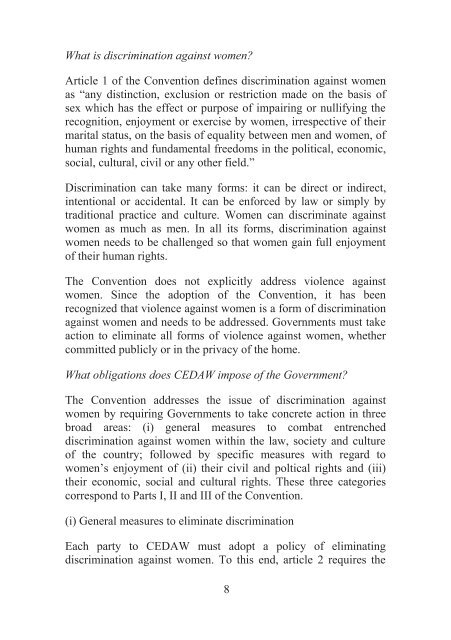Khmer - CEDAW Southeast Asia
Khmer - CEDAW Southeast Asia
Khmer - CEDAW Southeast Asia
You also want an ePaper? Increase the reach of your titles
YUMPU automatically turns print PDFs into web optimized ePapers that Google loves.
What is discrimination against women?<br />
Article 1 of the Convention defines discrimination against women<br />
as “any distinction, exclusion or restriction made on the basis of<br />
sex which has the effect or purpose of impairing or nullifying the<br />
recognition, enjoyment or exercise by women, irrespective of their<br />
marital status, on the basis of equality between men and women, of<br />
human rights and fundamental freedoms in the political, economic,<br />
social, cultural, civil or any other field.”<br />
Discrimination can take many forms: it can be direct or indirect,<br />
intentional or accidental. It can be enforced by law or simply by<br />
traditional practice and culture. Women can discriminate against<br />
women as much as men. In all its forms, discrimination against<br />
women needs to be challenged so that women gain full enjoyment<br />
of their human rights.<br />
The Convention does not explicitly address violence against<br />
women. Since the adoption of the Convention, it has been<br />
recognized that violence against women is a form of discrimination<br />
against women and needs to be addressed. Governments must take<br />
action to eliminate all forms of violence against women, whether<br />
committed publicly or in the privacy of the home.<br />
What obligations does <strong>CEDAW</strong> impose of the Government?<br />
The Convention addresses the issue of discrimination against<br />
women by requiring Governments to take concrete action in three<br />
broad areas: (i) general measures to combat entrenched<br />
discrimination against women within the law, society and culture<br />
of the country; followed by specific measures with regard to<br />
women’s enjoyment of (ii) their civil and poltical rights and (iii)<br />
their economic, social and cultural rights. These three categories<br />
correspond to Parts I, II and III of the Convention.<br />
(i) General measures to eliminate discrimination<br />
Each party to <strong>CEDAW</strong> must adopt a policy of eliminating<br />
discrimination against women. To this end, article 2 requires the<br />
8

















